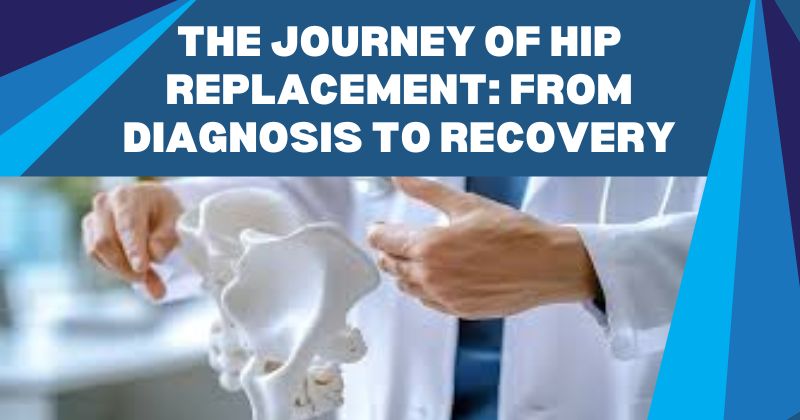
Hip pain can be debilitating, affecting everything from your sleep to your ability to walk. For many, the pain becomes so severe that even everyday tasks become a challenge. This is often the point when doctors begin to consider total hip replacement surgery as a long-term solution. If you or a loved one is facing this possibility, understanding the full journey—from diagnosis to recovery—can make the process smoother and less intimidating.
Understanding the Need: The Diagnosis
The journey begins with persistent hip pain that doesn’t improve with rest, medication, or physical therapy. Osteoarthritis is the most common culprit, but other conditions like rheumatoid arthritis, fractures, and avascular necrosis may also lead to severe hip damage.
Your doctor will typically start with a physical examination, followed by imaging tests like X-rays or MRIs to evaluate the extent of joint damage. When conservative treatments fail, and quality of life is significantly impacted, total hip replacement surgery becomes the recommended option.
What Is Total Hip Replacement Surgery?
Total hip replacement surgery is a procedure where the damaged cartilage and bone of the hip joint are removed and replaced with artificial components. These prosthetics are designed to mimic the natural function of your hip, allowing for smoother movement and reduced pain.
There are two main types of procedures: traditional and minimally invasive. The choice depends on several factors including the patient’s health, the severity of the damage, and the surgeon’s recommendation.
Preparing for the Procedure
Once you’ve been scheduled for surgery, there are several preparatory steps. Your healthcare team will conduct a preoperative assessment, which may include blood tests, ECG, and imaging. You’ll also be advised to stop certain medications and may need to make changes at home to ease your recovery—like installing handrails or using a raised toilet seat.
It’s also wise to consider the hip replacement surgery cost in India, especially if you’re budgeting for the entire journey. Costs can vary significantly depending on the hospital, city, type of implant, and whether you’re opting for a private or government healthcare facility. On average, hip replacement surgery cost in India ranges between ₹1.5 lakhs to ₹4.5 lakhs, making it one of the more affordable options globally without compromising on quality.
The Day of Surgery
On the day of the operation, you’ll be administered anesthesia—either spinal or general—depending on the recommendation. The surgery typically lasts 1 to 2 hours. Afterward, you’ll be moved to a recovery room for observation before being transferred to your hospital room.
Pain management, infection prevention, and early mobilization are the focus during the initial post-surgery phase. Most patients are encouraged to start walking with assistance within 24 to 48 hours post-surgery.
The Road to Recovery
Recovery from total hip replacement surgery is a gradual process, usually taking about 3 to 6 months for most people to regain normal mobility.
1. Hospital Stay and Early Recovery
Patients usually stay in the hospital for 3 to 5 days. Physical therapy begins almost immediately to help you regain mobility and prevent complications such as blood clots. You’ll learn how to sit, stand, walk, and use stairs correctly during this time.
2. Home Recovery and Rehabilitation
Once home, the focus shifts to rehabilitation. Regular physical therapy sessions are crucial, either at a center or through a home therapist. The first few weeks involve basic mobility and light exercises, gradually progressing to more strenuous activities as your strength and confidence improve.
It’s important to follow all your surgeon’s instructions carefully, especially when it comes to weight-bearing activities and wound care.
3. Long-Term Recovery
By the third month, most patients are able to resume normal daily activities without much discomfort. Some even return to low-impact sports like swimming, cycling, or golf. Your new hip is designed to last 15–20 years or more with proper care, making this a life-changing surgery for many.
Managing Expectations and Emotions
Undergoing total hip replacement surgery is not just a physical journey but an emotional one as well. Patients often report anxiety before surgery and frustration during recovery. Setting realistic goals, staying committed to rehab, and having a strong support system can make a significant difference in your mental well-being.
Why India Is a Preferred Destination for Hip Replacement
India has become a hub for orthopedic procedures, especially among international patients. High-quality care, experienced surgeons, and the affordable hip replacement surgery cost in India make it an attractive option.
Many hospitals in metropolitan areas like Delhi, Mumbai, Bangalore, and Chennai offer world-class facilities, English-speaking staff, and international patient services. This blend of affordability and excellence continues to draw thousands of patients from around the globe.
Final Thoughts
Facing hip replacement can be daunting, but understanding the steps involved can empower you to make informed decisions. From diagnosis through surgery to recovery, the journey is a commitment—but one that leads to a significantly improved quality of life.
Whether you’re weighing options locally or researching the hip replacement surgery cost in India, remember: it’s not just about getting a new joint—it’s about reclaiming your freedom, mobility, and peace of mind.
Would you like this formatted for a website (with headings, subheadings, HTML tags), or maybe a shorter version for social media sharing too?
For More Details:- (Click Here)